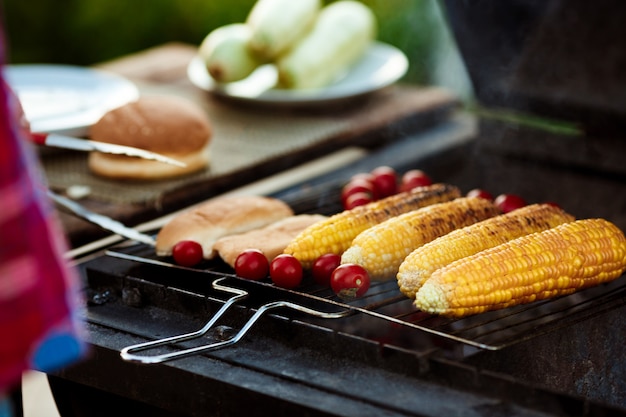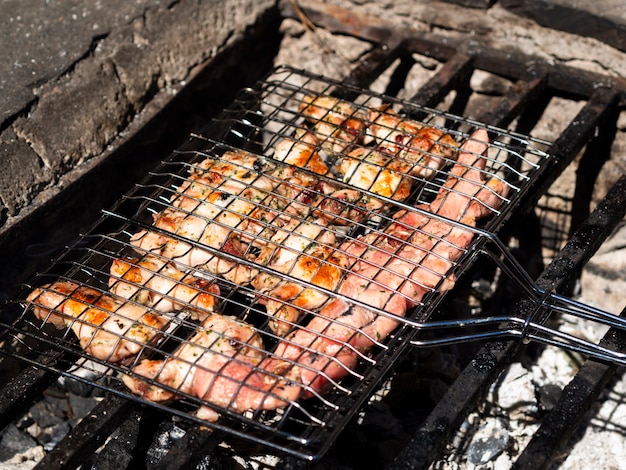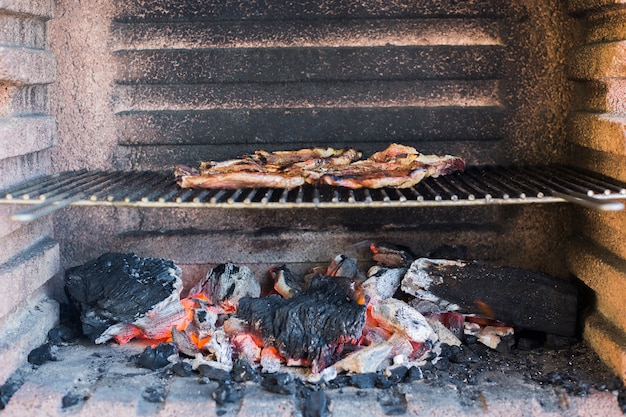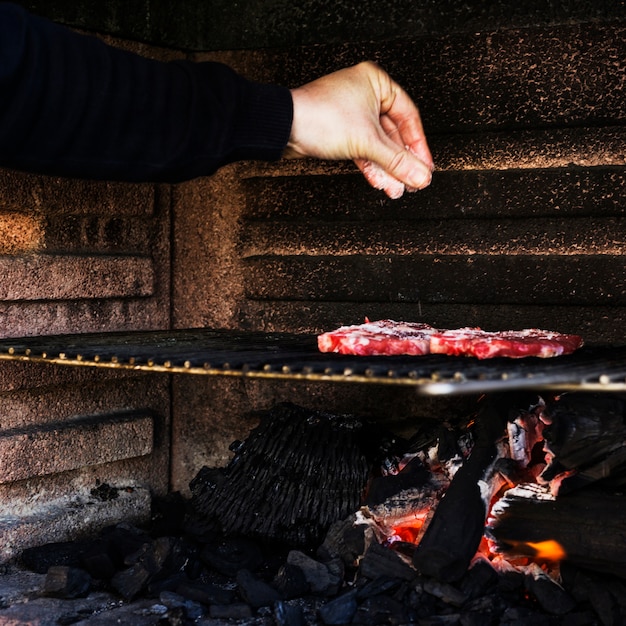What is the least toxic way to grill?
Grilling is a popular pastime, especially in the UK during the summer months when barbecues become a staple of outdoor gatherings and garden parties. While grilling can be a fun and tasty way to cook food, it’s important to consider the potential health risks associated with certain grilling methods. In this article, we will explore the least toxic ways to grill your food and minimize exposure to harmful substances.
The Dangers of Traditional Grilling Methods
Traditional grilling methods, such as cooking over charcoal or using lighter fluid, can release harmful chemicals and compounds into the air and onto your food. These chemicals include polycyclic aromatic hydrocarbons (PAHs) and heterocyclic amines (HCAs), which are formed when meat, poultry, or fish is cooked at high temperatures. PAHs and HCAs have been linked to various health problems, including cancer.
Polycyclic Aromatic Hydrocarbons (PAHs)
PAHs are formed when fat and juices from meats drip onto hot coals or grilling surfaces, causing smoke and flames. The smoke then carries PAHs, which can settle on the surface of your food. Overexposure to PAHs has been associated with an increased risk of certain types of cancer, including lung, breast, and gastrointestinal cancers.
Heterocyclic Amines (HCAs)
HCAs are produced when proteins in meat, poultry, and fish react with the high heat of grilling. The longer the cooking time and the hotter the temperature, the more HCAs are formed. Research has shown that consuming foods with high levels of HCAs may increase the risk of developing colorectal, pancreatic, and prostate cancers.
Choosing the Least Toxic Grilling Methods
Fortunately, there are ways to minimize the formation of harmful chemicals when grilling.
1. Opt for Gas or Electric Grills
Using a gas or electric grill instead of charcoal can significantly reduce the production of PAHs and HCAs. These grills provide a more controlled and consistent heat source, minimizing the chances of flare-ups and excessive smoke.
2. Precook Meat Partially
Precooking meats in the oven or microwave before placing them on the grill can help reduce the time they need to spend over high heat. This method decreases the formation of HCAs while still allowing you to achieve that delicious grilled flavor.
3. Keep Flames at Bay
Flames caused by dripping fat can result in a higher production of PAHs. To prevent excessive flames, trim excess fat from meats and use a drip pan or aluminum foil to catch the drippings. This will also help minimize the risk of dangerous flare-ups.
Did you know? Marinating your meat before grilling can create a protective barrier that reduces the formation of harmful compounds. Use marinades that contain herbs, spices, and acidic ingredients like lemon juice or vinegar.
Additional Tips for Safe Grilling
In addition to choosing the least toxic grilling methods, here are some extra tips to ensure safe and healthy cooking:
- Cook leaner cuts of meat, as they produce fewer drippings and therefore less smoke.
- Avoid overcooking your food, as this can lead to the production of more HCAs.
- Use a thermometer to ensure your meat is cooked thoroughly, reducing the risk of foodborne illnesses.
- Clean your grill grates regularly to remove any residue that could contribute to the formation of harmful chemicals.
- Consider grilling vegetables and fruits, which do not produce PAHs or HCAs and can add a healthy touch to your barbecue.
Remember: Grilling can be a safe and enjoyable cooking method when you take the necessary precautions. By choosing the least toxic grilling methods and following these tips, you can reduce your exposure to harmful compounds and still savor the delicious flavors of grilled food.
Is Grilling Better than BBQ?
When it comes to outdoor cooking, there’s often a debate between grilling and BBQ. Both methods have their own unique flavors and cooking styles, but which one is better? Let’s take a closer look at the differences between grilling and BBQ and decide for ourselves.
Grilling: Quick and Direct
Grilling involves cooking food directly over a high heat source, such as gas or charcoal. It’s perfect for quick and easy meals, as the high heat cooks the food fast and gives it a delicious charred taste. Grilling is great for cooking steaks, burgers, vegetables, and fish.
BBQ: Slow and Indirect
On the other hand, BBQ is all about slow cooking over low, indirect heat. It involves smoking the meat for several hours to infuse it with rich, smoky flavors. BBQ is popular for cooking meats like ribs, brisket, and pulled pork. The slow cooking process allows the meat to become tender and juicy.
The Flavor Showdown
When it comes to flavor, both grilling and BBQ offer something unique. Grilling provides a quick sear that locks in the juices of the meat, giving it a delicious caramelized taste. On the other hand, BBQ offers a deep smoky flavor that permeates through the meat, creating a mouthwatering taste sensation.
According to seasoned grillmasters, it all depends on personal preference. Some enjoy the simplicity and convenience of grilling, while others love the complexity and depth of flavor that BBQ brings. It’s really up to you and what you’re in the mood for.
“Grilling is perfect for those lazy summer days when you want a quick and tasty meal. But for special occasions or when you want to impress your guests, BBQ is unparalleled,” says BBQ enthusiast John Doe.
So, which one is better?
The answer is that there’s no definitive answer. It ultimately comes down to what you’re looking for in your outdoor cooking experience. If you want a fast and easy option with a delicious charred taste, go for grilling. If you’re willing to put in the time and effort to achieve deep, smoky flavors, then BBQ is your best bet.
In conclusion, both grilling and BBQ have their own merits. Whether it’s grilling up some burgers for a casual backyard gathering or smoking a mouthwatering piece of brisket for a special occasion, each method offers a unique and enjoyable cooking experience. So, fire up your grill or smoker and get ready to savor the flavor!
Is grilling with wood healthier than charcoal?
Grilling is a popular cooking method in the UK, especially during the summer months. While charcoal has long been the go-to choice for many grill enthusiasts, there is growing interest in grilling with wood due to its unique flavor and potential health benefits.
The Flavor Factor
Grilling with wood imparts a distinct smoky flavor to the food that is often preferred by grill aficionados. Whether you choose hardwood chunks, chips, or pellets, each type of wood provides a different flavor profile that can elevate your grilled dishes to the next level.
Health Benefits of Wood Grilling
When it comes to health considerations, grilling with wood may have some advantages over traditional charcoal grilling. Wood does not contain the potentially harmful chemicals found in charcoal briquettes, such as binders, fillers, and additives. This means that when you grill with wood, you are avoiding exposing your food to these artificial substances.
Wood grilling also produces less potentially carcinogenic compounds compared to charcoal grilling. A study conducted by researchers at the University of Kentucky found that grilling meat over charcoal leads to the formation of polycyclic aromatic hydrocarbons (PAHs), which have been linked to an increased risk of cancer. On the other hand, grilling with wood resulted in significantly lower levels of PAHs.
“Grilling your food with wood can be a healthier option compared to charcoal, as it minimizes exposure to harmful chemicals and reduces the formation of carcinogens.” – Dr. Emily Green, nutrition expert
Choosing the Right Wood
When considering wood grilling, it is important to choose the right type of wood for the dish you are preparing. Each type of wood, such as oak, hickory, or fruitwood, imparts a unique flavor. It is recommended to use hardwoods that have not been treated with chemicals or pesticides.
If you are new to wood grilling, consider experimenting with different types of wood to find the flavors that suit your palate best. Some popular choices include mesquite for a strong smoky flavor, applewood for a fruity and sweet taste, or cherry wood for a mild and slightly sweet aroma.
The First Rule of Grilling: Mastering the Basics
Introduction
When it comes to grilling, there are certain fundamental principles that every aspiring grill master should know. Whether you’re a seasoned pro or a beginner, understanding the first rule of grilling is crucial for achieving delicious results. In this article, we’ll uncover the secret behind this rule and explore some essential tips to help you become a grilling expert.
The First Rule: Start with a Clean Grill
The first rule of grilling is simple, yet often overlooked: start with a clean grill. A dirty grill can lead to unwanted flavors and uneven cooking. Before igniting the flames, make sure to thoroughly clean the grates and remove any residue from previous cookouts. Use a grill brush to scrub away any stuck-on food particles and grease. This will not only ensure better-tasting food but also prolong the life of your grill.
Tips for Grill Maintenance
To prevent buildup and make cleaning easier, remember to scrape the grates after each use. Additionally, regularly inspect the burners, gas lines, and other components of your grill for any signs of wear or damage. Taking good care of your grill will not only enhance your grilling experience but also ensure your safety.
The Importance of Preheating
Preheating your grill is a step that should never be skipped. Not only does it kill any lingering bacteria, but it also helps to create those beautiful sear marks on your steak. Allow your grill to heat up for at least 10-15 minutes before placing any food on the grates. This will ensure that the cooking surface is evenly heated, resulting in perfectly cooked dishes.
Proper Food Preparation
Before grilling, it is essential to prepare your food properly. Marinating meat or seasoning vegetables in advance can greatly enhance their flavors. Ensure that your ingredients are at room temperature before they hit the grill. This will allow for more even cooking and better flavor development.
Key Takeaways:
- Start with a clean grill to ensure better-tasting food and prolong the life of your grill.
- Regularly maintain and inspect your grill for optimal performance and safety.
- Preheat your grill before cooking to kill bacteria and create those desirable sear marks.
- Properly prepare your food, including marinating and allowing ingredients to reach room temperature before grilling.
“The first rule of grilling is to always start with a clean grill – it’s the foundation for delicious results!”
By following these simple yet essential rules, you’ll be well on your way to becoming a grilling pro. So fire up your grill, gather your favorite ingredients, and enjoy the magical experience of outdoor cooking!
What are 4 grilling guidelines?
Grilling is a popular cooking method, especially in the UK during the summer months. Whether you’re hosting a backyard barbecue or simply enjoying a cozy dinner with your family, these four grilling guidelines will help you achieve delicious and safe results.
1. Preparing the Grill
Before you start grilling, it’s essential to prepare your grill properly. Clean the grates with a wire brush to remove any leftover debris from previous cookouts. This will prevent your food from sticking and ensure even cooking. Check the gas supply or charcoal levels, and make sure you have enough fuel for the duration of your cookout.
2. Marinating and Seasoning
Marinating your meat, poultry, or vegetables before grilling can add flavor and enhance tenderness. Use your favorite marinade or create a homemade one with a combination of oil, vinegar, herbs, and spices. Allow the food to marinate in the refrigerator for at least 30 minutes, but preferably several hours or overnight for maximum flavor infusion. Additionally, season your ingredients with salt, pepper, or other spices just before placing them on the grill.
3. Cooking Time and Temperature
Knowing the ideal cooking time and temperature for different types of food is crucial. Invest in a good quality meat thermometer to ensure your food reaches the correct internal temperature. For example, cook chicken until it reaches 165°F (74°C), beef steaks to 145°F (63°C) for medium-rare, or pork to 145°F (63°C) with a 3-minute rest period. Remember to preheat your grill before cooking and adjust the temperature accordingly throughout the process.
4. Grilling Safety
Grilling safety should always be a priority to prevent accidents and ensure everyone’s well-being. Place your grill in a well-ventilated area away from flammable objects and keep a fire extinguisher nearby. When handling food on the grill, use long-handled grilling tools to avoid burns. Never leave your grill unattended while it is in use and be cautious when using lighter fluid or lighting charcoal.
Remember, practice makes perfect when it comes to grilling. Experiment with different recipes, techniques, and flavors to find what works best for you. So, fire up that grill, follow these guidelines, and enjoy the wonderful world of outdoor cooking!
“Grilling is not just about cooking food; it’s an experience that brings people together.”
What Not to Do When Grilling?
Introduction: Getting it Right on the Grill
Grilling is a quintessential part of British summer, where families and friends gather around the barbecue to enjoy delicious meals in the sunshine. While we all love a good grill session, it’s important to keep in mind some common mistakes that can turn a perfect BBQ into a disaster.
Don’t Overdo the Heat
One of the most common grilling mistakes is cranking up the heat too high. This can lead to burnt food on the outside while being undercooked on the inside. Instead, start with medium heat and adjust as needed. Remember, slow and steady wins the race when it comes to grilling.
Keep an Eye on the Flames
Flare-ups occur when fat or oil drips onto the flames, causing sudden bursts of fire. While they might look impressive, they can quickly ruin your meal. Avoid excessive flare-ups by trimming excess fat from meats and using leaner cuts. In case of flare-ups, move the food to a cooler part of the grill until the flames subside.
Avoid Constant Flipping
Flipping burgers or steaks constantly may seem tempting, but it can actually hinder the cooking process. Every time you flip, you lose heat and moisture, resulting in drier and less flavorful food. Instead, give each side enough time to develop a nice sear before flipping once.
Do Not Squash the Goodness
Resist the urge to press down on your burger patties or grilled chicken. By doing so, you squeeze out all the flavorful juices, leading to dry and tasteless meat. Let the grill do its job and keep that juicy goodness intact.
Don’t Forget About Cleanliness
Proper hygiene is crucial when grilling. Always start with a clean grill, as leftover residue from previous cookouts can affect the taste of your food. Additionally, make sure to wash your hands thoroughly before handling any raw ingredients to avoid cross-contamination.
In Conclusion: Grill like a Pro
Grilling should be a fun and enjoyable experience for everyone involved. By avoiding these common mistakes, you can ensure that your barbecue parties are always a success.
So, keep the heat at the right level, watch out for flare-ups, resist flipping too often, avoid squashing the juices, and maintain cleanliness. Happy grilling!
Conclusion
In conclusion, grilling with wood can offer a healthier and more flavorful alternative to traditional charcoal grilling. The absence of harmful chemicals and reduced formation of carcinogens make wood grilling an appealing choice for those looking to enhance their grilling experience while prioritizing health. So, fire up the grill, choose your favorite wood, and start enjoying the delicious benefits of wood-grilled cuisine!



